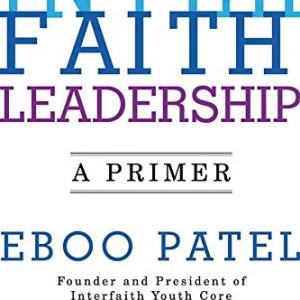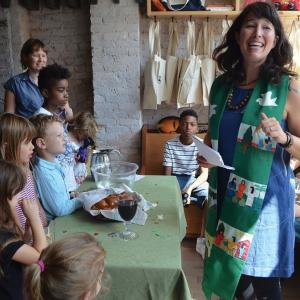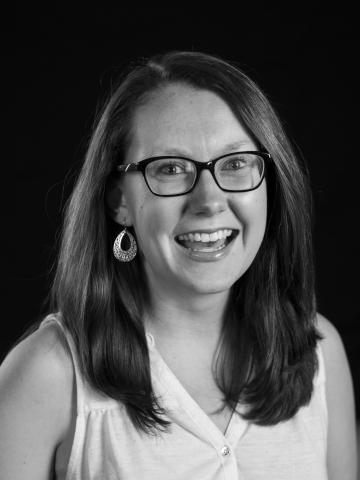
Olivia Whitener is an editorial assistant for Sojourners and would like to thank all of her college friends who requested help on their term papers for improving her editing and writing skills enough to serve in this position. Originally from Lawrenceville, N.J., Olivia has spent the past four years at Wake Forest University in Winston Salem, N.C. working towards her degree in Anthropology.
While at Wake Forest, Olivia focused her studies in cultural and linguistic anthropology, particularly human-rights based anthropology and intercultural communication. She enjoys balancing the intricate theories of cultural relativism and universal human rights when working toward justice throughout the world. Olivia is excited to explore the ways that print and online media can promote on-the-ground social justice work to make positive change.
For the past three summers, Olivia has spent her summers singing songs, leading games, and watching the Spirit move at Cross Roads Camp and Retreat Center in Port Murray, N.J., an ecumenical ministry of the Evangelical Lutheran Church in America and the Episcopal Church. In addition to singing songs around a campfire, reading while drinking a cup of coffee and laughing loudly in public places bring Olivia joy.
You can follow Olivia on Twitter: @owhitener.
Posts By This Author
When People Are Good
'Come From Away,' written by Irene Sankoff and David Hein; directed by Christopher Ashley.
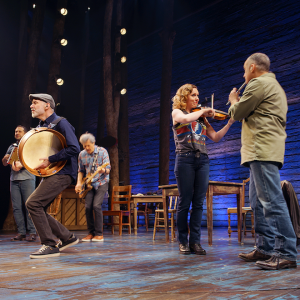
Courtesy of www.facebook.com/ComeFromAway/
WE ALL HAVE a story of where we were that September morning, when the crumbling skyline of New York City brought the country to a standstill. For people on thousands of airplanes in flight that morning, their stories began with emergency landings and sitting for hours on the tarmac in unexpected places after U.S. airspace closed. Of those stranded “plane people,” 7,000 arrived in Gander, Newfoundland—an island town of about 10,000 locals and limited resources. The new Broadway musical “Come From Away” provides a snapshot of the rest of that story.
At a preview performance in February, the audience was on its feet for an ovation before the lights went down. For 100 minutes the musical allows the audience to pause and reflect on the events of Sept. 11. Claude Elliott, the mayor of Gander (played in the show by Joel Hatch), introduced the 10th-anniversary commemoration of 9/11 in Gander by saying, “We honor what was lost. But we also commemorate what we found.” To sit in the audience alongside New Yorkers with intimate connections to that day and tourists with their own reasons for being there was to pay tribute to those memories as part of a community of strangers.
Missives Toward A Better Day
Radical Hope: Letters of Love and Dissent in Dangerous Times, edited by Carolina De Robertis. Vintage Books.
“TO MY FELLOW and artists; to my fellow readers and lovers of art; to my fellow believers in peace and a more perfect world ...”
Thus begins Viet Thanh Nguyen’s contribution to Radical Hope—“a collection of love letters in response to these political times.” The Pulitzer Prize winner (for The Sympathizer) goes on to describe his dreams for a new model for our society, one that includes prophecies, poets, and the people: “Those of us who would tear down walls and eradicate borders, and who believe in both inclusion and equality, need to use our talents to help build a coalition.”
The dozens of letters in Radical Hope illustrate the dreams of this diverse community of writers. Luis Alberto Urrea asks, “What if there is no Other? What if there is only Us?” Katie Kitamura writes of a future in which her daughter grows up believing in the generative power of language. Many of the writers pen poetic reflections on the beacons of light and love who have guided them, looking to the past to bring enlightenment into the next journey. In the final letter, Cristina García imagines the world seven generations from now, asking what that will look like and wishing upon her great-great-great-great-great granddaughter “adventure and loving protection.”
St. Valentine: A Reminder of Radical Christian Love
As Christian witnesses, we should use the feast of Saint Valentine to care deeply for one another and especially for those who are persecuted by those in power. Flowers and candies and candles are nice — but this year, I’d much rather be smashing patriarchy, overturning the “refugee ban,” creating pathways to citizenship, and supporting high quality education for all children. And my valentine can join me in my ventures.
Music Is More Important Now Than Ever

Sharon Jones. Image via Man Alive!/Flickr
Earlier this year, Tripp Hudgins wrote a piece declaring that all his favorite theologians are dying. He listed David Bowie and Pete Seeger as two theologians whom he felt sang “real theology about a real God” during their lifetimes. Others would later add Prince and Phife Dog and Sharon Jones to their lists of songwriters who spoke lyrics of truth in a broken world and who are no longer with us. Leon Wieselthier described his friend Leonard Cohen as “the lyrical advocate of the finite and the flawed” in a beautiful eulogy in the New York Times just the other week. Could a musically gifted person of any faith be honored with better words than those?
What Mother Teresa Taught Me About Love

Image via Zvonimir Atletic/Shutterstock.com
A sign that hung in the volunteer room at Shanti Dan quoted Mother Teresa, reading, “I pray each one of you to be holy and so spread [God’s] love everywhere you go. Light [God’s] light of truth in every person’s life so that God can continue loving the world through you and me.”
This was not just a commission for those serving in Kolkata. Poverty, violence, hatred, sadness, hopelessness, crime, greed, darkness, jealousy exist in our homes across the world. And Mother Teresa was known for encouraging people to serve their neighbors in their hometowns or wherever they are called, striving to love each person as God loved us.
To Know and Be Known
Interfaith Leadership: A Primer, by Eboo Patel. Beacon Press.
“WE CAN'T PUT cheese on all of the hamburgers for dinner, and can you please say ‘Dear God’ not ‘Dear Jesus’ when you pray?” These were instructions I gave to my dad before a birthday party in elementary school, worried that my new Jewish friends would not feel comfortable in our Christian home. Because I grew up in a religiously diverse area, I was cognizant of differences in religious practice before I knew the beliefs behind my own Christian rituals.
This is how my journey of interfaith learning and leadership began: by inviting my friends from school over to play and making sure they had something to eat. In his book Interfaith Leadership, Eboo Patel defines interfaith experiences as those “where people with diverse faiths interact, and their faith identities are somehow involved.” We weren’t just religiously diverse students sitting next to each other at school sharing our crayons—we were in each other’s homes, and that meant our faith identities were exposed and explored.
Interfaith Leadership outlines three questions that come up in interactions with people different from you: Who am I? Who are you? How do we relate to each other? Through stories of his experiences and those of friends from different faiths, Patel, founder of Interfaith Youth Core and a Sojourners columnist, shows us the process of becoming an interfaith leader who builds bridges and strengthens communities. He explains theories behind interfaith work in a way that is easy to understand, applying them directly to daily interactions and conflicts. For a short primer, Interfaith Leadership could be the most helpful tool for anyone striving to develop “positive, constructive, warm, caring, cooperative engagement” (aka “relationship”) with others.
In a World of Darkness, Be Like Mary Magdelene
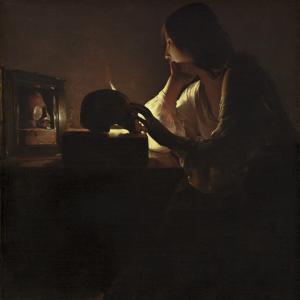
"Magdalen," by Georges de la Tour. Image via Everett - Art/Shutterstock.com
The woman who preached the first Easter sermon is known more for a fictionalized relationship with the Christ than for the words of light and life she brought to the world. The woman who stood by the cross until Jesus took his last breath is characterized by sexual promiscuity — one that is nowhere within the recounting of her ministry and her faithfulness.
Short Takes: Matt and Simone Weber
Five questions for Matt and Simone Weber
In 2011, Matt and Simone Weber co-founded Table Grace Cafe in Omaha, Neb.—a community lunch cafe staffed with volunteers who participate in a 10-day restaurant internship program. Simone is a Nashville-recorded singer-songwriter and Matt has culinary training from the Natural Gourmet Institute in New York. Together, the Webers spread a message of grace along with a cup of homemade soup and gourmet pizza.
Website: tablegracecafe.com
1. Why did you decide to incorporate a job assistance program?
Matt: I knew that we would be using volunteers off the street every day, since that’s one way people can get food—if they can volunteer. We were running into people who were in transition, from jail or homelessness, and could use that service. And because I have culinary training and education, it was easy for me to come up with this concept.
2. I hear you don’t have a cash register at the cafe.
Matt: That’s right. It’s a donation box instead of a cash register. We have no prices on our menu. We tell people what the food is worth, but we don’t require a certain amount. We believe that everybody is able to be generous no matter where they are in life. By allowing people to give a free-will donation, we’re meeting people where they are and inviting them to give what’s generous for them.
bell hooks' Guide to Living With Love
We’re a couple taking on Emma Watson's #feminist reading list together. Here’s what we’re learning.

Image via Belinda Pretorius/Shutterstock.com
It wasn’t until recently, with the advent of modern capitalism, that people have retreated to the private sphere. This means we now believe that people can live secluded lives, only interacting with our most intimate connections — whether that be our nuclear family, romantic partner, or just with a pet. Hannah Arendt, another philosopher, offers a similar critique on people's retreat from the community and into the private sphere, naming it as a byproduct of capitalism.
'The Berrigan Letters' Reveals a Life of Love and Admiration

Image via Joanna Dorota/Shutterstock.com
For 30 years, the Berrigan brothers led the nonviolent charge against war, poverty, and racial injustice, writing letters to each other and to other loved ones throughout their years of activism. Their work took them all over the country and world (including to a 1985 Sojourners Peace Pentecost celebration in Washington, D.C.), and these letters catalog their dreams, plans, worries, and prayers during their travels. From news clippings, poems, and reports about trials, to birthday greetings and responses to political elections, the Berrigan brothers expressed honesty, faithfulness, and love for one another and the world.
Does Religion Belong in Public Health?
Beholden: Religion, Global Health, and Human Rights, by Susan R. Holman. Oxford University Press.

Photo via szefei / Shutterstock
At 17, AS I SAT in a comprehensive health center in Namibia, a health care worker told my visiting religious group what the center really needed from outsiders to improve the care they offered. As a peer health educator at my high school, I entered the facility thinking I knew the universal cure for preventing HIV infection—education—and feeling sad that so many places in the world did not yet have access to the life-saving drugs because they could not afford them. I was naïve and incorrect on many fronts.
They had the drugs, the health worker told us, and they had a well-developed education plan both for prevention and antiretroviral therapy. What they really needed right then was baby formula, to prevent HIV-positive mothers from passing the virus on to their newborns. So the next time we wanted to donate to the organization, he said, please send formula or the money to purchase some, instead of knitted newborn hats or volunteers ready to paint the facility walls.
Susan R. Holman, in her book Beholden: Religion, Global Health, and Human Rights, provides valuable narrative, analysis, and information that can similarly open the eyes of religious leaders about helpful, sustainable, and respectful ways to approach health-related needs throughout the world. Unlike many global-health academics and activists, who simply dismiss religious efforts as destructive or limited, Holman asserts that religion must be incorporated into global-health initiatives “because faith matters to the large majority of people who are poor in this world.” Global-health initiatives cannot ignore the influence faith has on health, moral decision-making, and community structures.
It's Not Really About the Waffles
A child-centered worship service encourages a sticky faith.
Last year, St. Lydia’s church in Brooklyn, N.Y., started a monthly service that lifts up children’s leadership and participation. They call it Waffle Church, and it’s messy on purpose. Olivia Whitener, an editorial assistant at Sojourners , interviewed Waffle Church minister Sarah McCaslin in January about the service that revolves around songs, stories, maple syrup, and the love of Jesus.
Sojourners: Why waffles?
Rev. Sarah McCaslin: Well, I prefer a savory brunch option, if given the choice. But “Omelet Church” just doesn’t have the same ring. The fact of the matter is: Who doesn’t love a waffle? They’re easy to make, they’re delicious. But the waffles aren’t as important as the idea of this meal we share around the table. It isn’t that we’re going to church and then will have waffles. When we sit around the table together and fellowship together, it’s an extension of communion.
What’s special about a Waffle Church service? The first time we did Waffle Church, I was standing at the table, and I do a rhetorical-question-style liturgy: “Look, we are gathered around this table, and we set it with our finest. This is not the Lutheran table, it’s not St. Lydia’s table, it’s not Waffle Church’s table. Whose table is this?” Then a 6-year-old shouts, “It’s the Lord’s table!” We couldn’t have planned it, and it was just amazing. Of course, now we have to do it because there’s always the kid who wants to shout “It’s the Lord’s table!” And so here’s a piece of the liturgy that has been fixed because the children will demand it. That kind of stuff is just happening all the time.
Are there ways other churches can incorporate a Waffle Church service into their ministries? I think it’s about creating a physical space that can accommodate the needs of children. The music is the other major piece of it. At St. Lydia’s, we adhere to the paperless-music singing tradition, where all of the songs are taught. So there’s no hymnal, no lyrics to be read—those things tend to privilege literacy. This way, children and adults can participate in the music each and every week.
3 Reasons I Tithe — Even If It’s Not Much

Image via Dobo Kristian/Shutterstock.com
3. Jesus already taught us how to tithe.
As I reflected on the practice of tithing more deeply, I realized that the parable in Mark 12 of Jesus recognizing the widow who offers two copper coins is one that influences my concept of discipleship — including monetary giving. It is cliché, because it is the lesson that is frequently read during budget meetings and stewardship drives. But the woman’s faith and commitment truly have been a reminder that it is not about how much I give, or even really whether I give anything. Jesus recognizes her sacrifice and discipleship, as evidenced through her monetary offering, and asks us to follow her lead.
Being a member of a church comes with many expectations. But so does being a Christian. A theological belief in salvation through grace alone roots my faith, but so does the action of giving of my time, talents, and earthly possessions to those who have less. I am both loved by God as an individual, and called to be in a community.
Encountering God in 'The Color Purple'
We’re a couple taking on Emma Watson's #feminist reading list together. Here’s what we’re learning.

Image via Ihnatovich Maryia/Shutterstock.com
During summers working at camp, one thing we did together was draw who we thought God is. The campers and I would draw anything from stars in the night sky to pictures of their friends and family to copies of images of God they had seen in paintings. Then, like Celie and Shug Avery in this passage from The Color Purple, the campers and I would discuss together how God should not always be thought of as an old white man. That image of God is limiting for those of us who cannot identify with such a figure. When you think God looks like a person who represents oppression, danger, or injustice, you don’t want to have anything to do with that God. When you broaden the scope to say God is in everything and everyone, then everyone, including me and Celie and my campers, has a part of God’s light inside us.
Carrying Love Against Hate
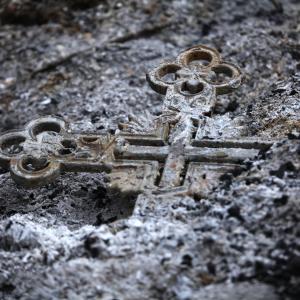
Image via mrivserg/Shutterstock.com
Without his community of his sisters and family, who have been mourning his death and questioning God for not saving their brother and friend, Lazarus would remain entombed. Without community, we remain bound and entombed. I’m not saying that our actions are as great as Jesus raising someone from the dead. But I am saying that God entrusts us with living into community, so that we may welcome our brothers and sisters out of death and into life.
11 Must-Read New Books On Racial Justice and Faith
February is Black History Month. Dive into these books now...and read all year long.

Image via Rawpixel.com/Shutterstock.com
Have you read America’s Original Sin by Jim Wallis and want to read more about the present civil rights movement and how the church needs to get moving? Did you stay up all night finishing Ta-Nehisi Coates’ Between the World and Me and are looking for other memoirs to lead you to more questioning of the world? Have you been waiting for another book to spark discussion in small groups, like Bryan Stevenson’s Just Mercy?
I reviewed our book collection of new releases from the past year and compiled a list of the most important new books to read. Enjoy!
Emma Watson Book Club
We're a couple, taking on the star's #feminist reading list together. Here's what we're learning.

Image via UN Women/Flickr
Steinem says that from traveling so much, she had an opportunity to hear from so many different groups of people — proving that, “Hate generalizes, love specifies.’” And that’s one of the theories of social change, right? Hearing personal stories brings a better sense of understanding that can get more people on board and connected.
Gun Deaths Are No Accident
No guns, no gun deaths. That was the mantra ingrained in me from a young age. It is the line that runs through my head when I read reports stating that around 3,000 of the more than 30,000 gun-related deaths in the U.S. each year are of children. In 2015, 265 minors were responsible for accidental gun shootings and 83 of these children killed someone, often because they found a loaded gun in the house and were curious.
QUIZ: Which Kind of Nonviolent Activist Are You?
There are different ways to understand the gospel's call to peace — and that's a good thing. In the last century alone, many influential Christian leaders have grappled with violence, justice, and peace, and ended up all over the nonviolence map. Where do you land? Take our quiz and find out!
Here I (Still) Stand...498 Years Later

Image via Molodec/Shutterstock.com
Oct. 31 is approaching quickly — a day marked throughout the United States by costume contests, pumpkin carvings, and children knocking on neighbors’ doors with questions of “trick or treat?”
But for Protestant churches around the world, Oct. 31 is also a celebration of a grown man knocking on a (rather large) door, asking a different question of the Catholic Church:
From whom does salvation truly come? And a follow-up: How do we refocus the church on the Gospel?
On this date, almost 500 years ago, Martin Luther hammered his 95 Theses onto the front doors of All Saints’ Church in Wittenberg, Germany — an act that, unforeseen by Luther at the time, is now credited with beginning the Protestant Reformation. Luther’s 95 Theses outlined his abstentions to the practice of selling indulgences to guarantee Christians salvation, emphasizing that grace is given by God alone and can only be assured by the clergy, not bought from them.
With the help of the social media of his day — the newly-improved printing press — news quickly spread to people throughout Europe that Martin Luther was questioning the papacy and attempting to refocus the church’s theology on forgiveness through the word and the eucharist, neither of which required financial prosperity. Within a few years, Martin Luther was excommunicated from the Catholic Church for his continued teachings, which included suggestions that the Bible should be accessible to all people and that priests not necessarily need to be celibate.
The Reformation gathered Christians from across Europe into a community of “rebels,” from which multiple denominations would spring up over the next half a century.
Today, 498 years later — with of a Catholic pope nicknamed “The Peoples’ Pope,” who is on Twitter and preaches about income inequality — what would Luther think of the state of the church?


